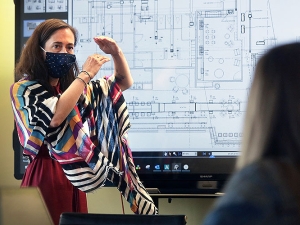

Research Bio
Laura Kray is a social psychologist whose research focuses on gender, leadership, and decision-making. She examines how stereotypes and organizational culture influence negotiation, confidence, and performance. Kray’s work integrates psychology, behavioral economics, and management to design interventions that promote equity and empowerment in workplaces. Her research contributes to understanding the psychological foundations of gender dynamics and leadership effectiveness.She is Professor of Management at UC Berkeley’s Haas School of Business. A Fellow of the Society for Personality and Social Psychology, she mentors students in negotiation, gender equity, and organizational behavior.
Research Expertise and Interest
gender, negotiations, stereotypes, decision making, mindsets, motivated cognition
In the News
Economy, Sexism and Conspiracies Fueled Trump’s Reelection
UC Berkeley scholars offer a sharp and sometimes unsettling assessment of election dynamics at play.
Kamala Harris’ Hidden Foe: Pervasive Bias Against Powerful Middle-Aged Women
Women who rise through the ranks and succeed win our respect, but we also penalize them because we see them as less warm, less nurturing.
New Research Shatters Outdated Pay-Gap Myth That Women Don’t Negotiate
Contrary to popular belief, professional women now report negotiating their salaries more often than men, but they get turned down more often.
Who Flirts to Get Ahead at Work? Study Finds It’s Most Often Men in Subordinate Roles.
The stereotype of the female secretary who hikes up her skirt to get a promotion is as pervasive as the powerful male boss who makes passes at his underlings. But a new study upends both tropes with evidence that it’s actually men in subordinate positions who are most likely to flirt, use sexual innuendo, and even harass female bosses as a way to demonstrate their masculinity and power for personal gain at work.
Very big changes are coming very fast to the American workplace
Going to work used to be so simple. Across a span of decades, in organizations large and small, American white-collar workers by the millions would wake up in the morning and get to the office by 8 or 9. They would leave at 5 or 6, perhaps later if they were on deadline with an important project. It was like clockwork.
Suddenly, however, that model seems outdated, if not archaic. In a series of interviews, Berkeley scholars who study work and management say that as the COVID-19 pandemic eases, American executives and office workers are emerging into a new and unfamiliar world that may have broad benefits for both.
When women are more likely to lie
Would you tell a lie to help someone else? A new study says women won’t lie on their own behalf, but they are willing to do so for someone else if they feel criticized or pressured by others.
Study Finds Flirting Can Pay Off for Women in Negotiations
When Madeleine Albright became the first female U.S. Secretary of State, she led high-level negotiations between mostly male foreign government leaders. In 2009, comedian Bill Maher asked Albright if she ever flirted on the job and she replied, “I did, I did.” Flirtatiousness, female friendliness, or the more diplomatic description “feminine charm” is an effective way for women to gain negotiating mileage.
Featured in the Media
Please note: The views and opinions expressed in these articles are those of the authors and do not necessarily reflect the official policy or positions of UC Berkeley.
Loading Class list ...







